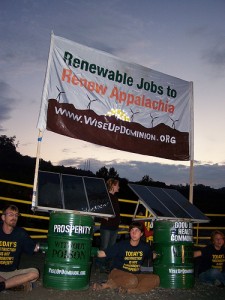Holy smokes!!
Wise County lockdown and blockade! Al Gore! Direct Action! RAN! Rising Tide!
All in the pages of a national news magazine.
Check out this great story by Bryan Walsh at Time magazine about the Wise County action from September. A very good piece on the growing use of direct action in the coal and climate movements and how we need more of it.
And BTW, this is our movement and we need you to join us. If you want to get more involved in it, Nov 14-15 is a mass day of action using all sorts of creative direct action in (currently) 47 locations around the U.S. and Canada. SIGN UP HERE-www.dirtymoney.org
Taking On King Coal
By Bryan Walsh
Nothing could sway the Dominion 11 from their mission–not the cops and certainly not the prospect of free food. Early on the morning of Sept. 15, activists from a range of environmental groups formed a human barrier to block access to a coal plant being built by Dominion in rural Wise County, Virginia. As acts of civil disobedience go, this wasn’t exactly Bloody Sunday. The police took a hands-off approach and even offered to buy the protesters breakfast if they unchained themselves. (They declined.) But the consequences were far from trivial. The activists who had formed the barrier to the construction site were arrested and charged with trespassing, and they eventually paid $400 each in fines. That’s nothing, of course, compared with the punishment the Dominion plant will inflict on the environment. If completed, the plant will emit 5.3 million tons of CO2 a year into the atmosphere, roughly the equivalent of putting a million more cars on the road.
The future of coal will dictate the future of the climate. Plants in the U.S. that burn this low-cost, high-carbon fuel account for about 40% of the country’s greenhouse-gas emissions, not to mention other air pollutants. Right now there are about 600 coal power plants in the U.S., and an additional 110 are in various stages of development. Without ways to capture the carbon burned in coal and sequester it underground, new plants all but guarantee billions of tons of future carbon emissions and essentially negate efforts to reduce global warming. “Business as usual can’t continue as long as coal is destroying the climate,” says Hannah Morgan, 20, one of the Dominion 11. “We are not going to back down.”
Environmentalists are fighting new plants with every weapon in their arsenal, from launching lawsuits over CO2 regulations to lobbying financiers to stop investing in coal. Governors in states like Kansas and Florida are blocking new plants. But to some greens, the threat of new coal plants coming online is so dire that it demands a more corporeal level of engagement. This fall, at the annual meeting of the Clinton Global Initiative in New York City, Al Gore announced, “I believe we’ve reached the stage where it’s time for civil disobedience to prevent the construction of new coal-fired power plants that do not have sequestration.”
Hard-core activists like Morgan have already heeded Gore’s call. Many work in groups like the Rainforest Action Network (motto: “Environmentalism with teeth”) and Rising Tide. But this isn’t just the work of coastal élites; on Oct. 26, dozens of locals in Kansas picketed the massive Lawrence Energy Center, the 12th most polluting coal plant in the U.S. Similar protests pop up anywhere a new plant is being built.
“People are willing to put their reputations and their livelihoods and physical well-being on the line for the climate,” says Scott Parkin, an organizer for the Rainforest Action Network who has been involved in the Dominion campaign in Virginia. The September protest in Wise County was just the latest in a string of nonviolent acts against Dominion’s new coal plant, including a blockade of the company’s Richmond headquarters in June.
The coal industry counters that the sheer rise in demand for electricity–projected to increase 30% by 2030, according to the federal Energy Information Agency–means a new generation of coal plants is inevitable. Dominion executives point out that Virginia has a projected shortfall in electricity supply and that the Wise County plant is needed to close that gap.
Coal remains cheap and plentiful in the U.S. (as long as no price is put on carbon emissions), and its supporters argue that “clean coal” will solve the pollution problem. But it’s not clear what they mean. “Clean coal” can refer to new technologies that remove pollutants like soot and sulfur dioxide from the waste process, or it can mean capturing and sequestering the carbon burned in coal. The former exists–the Dominion plant is a good example–but the latter does not. And a new report by the International Energy Agency noted that research for sequestration projects remains badly underfunded. “Clean coal is like healthy cigarettes,” Gore said. “It does not exist.”
For many green activists, climate change is fundamentally a moral issue. To accept a new generation of polluting coal plants is to doom future generations to an impoverished planet. So the response should be fundamentally moral as well, using the same tactics–civil disobedience, nonviolent protest–as those of the civil rights movement.
Technology and economics alone won’t solve the climate crisis. Moral suasion of the sort exemplified by frontline activism is needed too, as Gore noted. “It’d be more powerful if he put his body where his mouth is,” says Abigail Singer, a Rising Tide activist. In other words, there will always be room on the human chain for you, Al.
